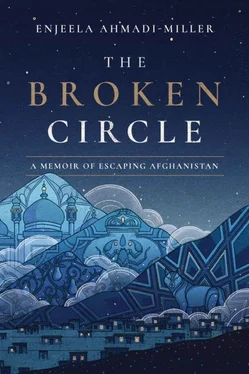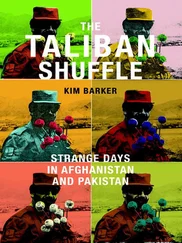In the backyard was another room: a building, separate from the house, that wasn’t on our tour. We knew they wanted us to stay away. My hosts were so pleasant and kind, I decided to rein in my inquisitiveness.
Each morning four servants served us a breakfast of eggs, bread, potatoes, and tea. Each evening we had an elaborate dinner with many courses: lamb, beef, chicken, and vegetables and rice, rich with spices—turmeric, brown and green cardamom, cinnamon, and black pepper—all served by the well-dressed servants, who could have been waiting on kings and queens. We were pampered, fed, clothed, and looked after like we were part of the family. Habibah and Daliyah were particularly warm and caring, very much like their father, who radiated peace and kindness.
In the afternoons, I spent time in the room with the swing, relaxing and reading and talking with my sisters and Zia. Padar spent his days with Abbas. They seemed to have a lot to talk about, because those two were always together.
One afternoon the two sisters called in their driver to take us four kids to a bazaar. It was very different from the one I’d seen in Peshawar—this was more like a big outlet mall. They bought us Pakistani dresses called Punjabi with bangles and earrings to match. We were in heaven. The second we arrived home, I ran to the room I shared with Laila to try them on. Then Habibah drew on my palms with henna. I floated in a world of ease filled with simple pleasures.
I was being treated like a princess, but Youssef, Muzghan, and Sophia from the refugee camp were never far from my thoughts. Their laughter, playful shouts, grimy faces, and their aspirations to escape from the muddy, smelly life in tents all mingled in my thoughts while Habibah drew on my palm, the soft, warm strokes of the brush sending chills of comfort through me. This dream, for I knew it as one, couldn’t last. For nearly a year, I had run with my friends through the muddy lanes of a rambling tent city and lived on crusts of bread and milk with my sisters and Zia in a tiny hotel room, always teetering on the very edge of a fierce hunger. That seemed to be the world most people lived in every day of their lives. Abbas’s daughters’ care and solicitude couldn’t guarantee it wouldn’t happen again, that my life wouldn’t turn from this sunny way of living into one of sleeping on cold dirt with nothing but a chador to cover me. I tried to push the real world out of my thoughts and enjoy this pristine house of servants and bright colors every minute I could.

One morning I rose early, before even my hosts, and padded downstairs. The dawn twilight slowly merged into a new day. Through the large window of the family room, I spotted the white one-story house in the large backyard. Several men I hadn’t seen before walked up a stone path and disappeared inside.
My curiosity overcame me. Even though I knew I shouldn’t go, I stole outside and followed the stone path to the wide-open door of the building. The room was large and filled with people silently seated on prayer mats. In the middle of the room, an old man sat cross-legged on several cushions, his eyes closed as if he were meditating. The men and women surrounding him were deep in prayer. Among them, I noticed Padar. He sat in the front, next to the old man, praying. I waited by the door, taking in what they were doing. Soon they stirred to leave, and many of them approached the old man in the center and kissed his hand before turning to the door.
I’d never seen so many people, even in the great mosque of Kabul where we had gone to pray, pay one man so much respect. I knew this man must be holy. There was a sense of peace and love in the room. They had all touched something higher, apprehended something peculiar that drove my curiosity. Questions fired through my mind. As I watched the people with contented glows on their faces stream by me, I felt a firm hand on my shoulder. I turned to see the gentle smile of Abbas’s wife.
“You shouldn’t be here,” she said. “This is for adults who come here to ask for their sins to be forgiven. That is Jaleel, a very holy man, and he prays for them.” She took my hand and led me back into the house.
All day I wondered what sins Padar had asked forgiveness for. Maybe he felt bad about his drinking and his fighting with Mother and the stress his behavior had had on all of us. The sight of Padar reverently approaching Jaleel made me wonder what made the man so holy.
I wanted to discuss this more with Padar, but it seemed every day when I tried to find him, he was either meeting with Abbas and Jaleel or they had left the house. We all knew he was working hard to find a way to get our passports. With so much at stake, whether we would be able to travel to India, it didn’t seem right that we spent all day swinging in the indoor play room, reading, playing games, and eating lavish meals, but there wasn’t much else to do but to enjoy myself. Besides, Padar had not given any of us one shred of doubt that he would get the documents we needed. Week blended into week, and it seemed like we were going to stay here forever.
One night after dinner, Padar sat with us in the large living room, where my sisters and Zia were gathered to read poetry. We behaved as if we had moved in. “Aren’t they tired of us yet?” I asked.
Padar crossed his legs and brushed back a shock of black hair. “In our culture we never tell our guests to leave. Our religion requires we take care of the less fortunate. These people are my good friends, and this is what friends do—we take care of one another when we are in need. Abbas knows I would do the same for him and his family any day if he were in my shoes.”
I asked him, “What do you mean if he wore your shoes?” I couldn’t imagine Abbas wearing Padar’s shoes.
He laughed. “No, no, nothing to do with shoes. I meant that if Abbas was in the same situation we are in, and I could help him, I would.”
I had to let that sink in, but I thought I understood it.
Not too long after that conversation, he invited all of us to sit with him when Jaleel spoke. The holy man talked about spirituality from morning till night, and people would come so they could hear his words of wisdom. I liked what he said, and I attended almost every day.
“We are all God’s children, and we are all connected somehow.” This made me think about Mina. She’d been like a sister to me, but our lives had been so different. Had she been less fortunate? She had never been able to attend school like I had. Nor had she had a personal guide, as we did, who took her step-by-step out of the war. She had no one to protect her from her husband and his other wife. Nor did she have parents who would never sell her for any amount of money. Padar had taken care of us, made our way of escape, then risked his life to reach us, and now worked hard to take us to the next step on our journey. I considered us fortunate, despite what Padar had said about our situation.
In the early-morning sessions, Jaleel spoke and then read poetry. His poems always spoke of how we were all in the hands of Allah. That he was all around us and knew each of our steps. This brought great joy to me and peace, knowing God watched over our family. When he finished, everyone unrolled their prayer rugs and did namaz . These daily prayers became a time of meditation, and a sense grew in me that our journey would be a great success. That I was going to see Mommy at last. I believed it with every inhale and exhale as I offered my prayers to Allah.
Every night as I lay in bed, I had so many questions about why the world was the way it was. Why things happened to certain people. I wanted to talk to Jaleel some morning after everyone left. He often met with Padar. Being here in this house, listening to Jaleel’s talks and watching Padar and Abbas together discussing poetry and Allah, I couldn’t help but imagine these men were closer to God than any I’d ever met. I felt I was closing in on something. Something far too big to touch or even understand in great detail.
Читать дальше













